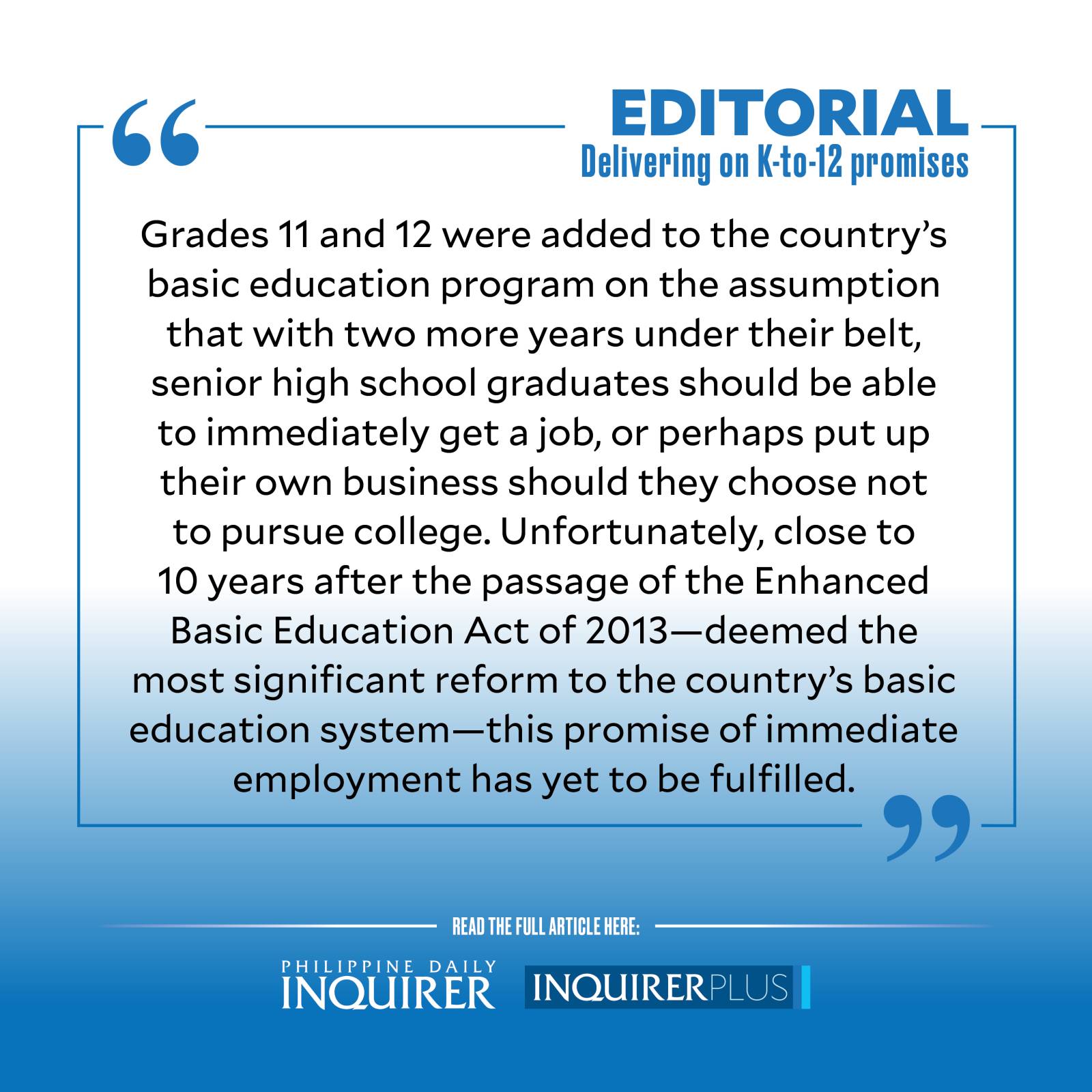Delivering on K-to-12 promises
Grades 11 and 12 were added to the country’s basic education program on the assumption that with two more years under their belt, senior high school (SHS) graduates should be able to immediately get a job, or perhaps put up their own business should they choose not to pursue college.
Unfortunately, close to 10 years after the passage of Republic Act No. 10533 or the Enhanced Basic Education Act of 2013—deemed the most significant reform to the country’s basic education system—this promise of immediate employment has yet to be fulfilled. It would likely remain so, as the private sector continues to prefer hiring college or university graduates over those who finish the K-to-12 program.
Indeed, at the conclusion of the 48th Philippine Business Conference of the Philippine Chamber of Commerce and Industry two weeks ago, Vice President Sara Duterte scored the apparent “diploma mentality” in the country, and appealed to the private sector to shed their rigid preference for degrees, and instead, consider hiring K-to-12 graduates.
“Kailangan bang graduate ng four years college ang mga ine-employ ng ating mga industries?” asked Duterte, who is concurrent secretary of the Department of Education.
So far, it’s a firm yes. According to a December 2020 study by the Philippine Institute for Development Studies (PIDS), only one in five senior high school graduates enter the labor force, with the rest opting to continue with their education.
And yet once in the labor market, the study revealed, there is “no clear advantage nor disadvantage [among] SHS graduates compared to [Grade 10] or second year college completers.”
As a result, employers have adopted “a wait-and-see attitude” about hiring K-to-12 graduates, saying “they needed to know more of what SHS graduates can do before hiring them.”
“At this juncture of the economy, data is saying we cannot expect most of the SHS graduates to enter the labor force,” said the PIDS study titled “On the Employability of the Senior High School Graduates: Evidence from the Labor Force Survey.”
The private sector cannot be forced to hire SHS graduates just to bump up the numbers, stressed Go Negosyo founder and former presidential adviser for entrepreneurship Jose Concepcion III. They have to pass and prove themselves qualified for positions that are open to both K-to-12 and college graduates.
“The final decision will rest with the private sector, and we have to respect that because they are the ones hiring,” Concepcion said.
The PIDS findings jibe with the DepEd’s own sobering assessment that the jobs generation objective of the K-to-12 program had not been met, said DepEd spokesperson Michael Poa.
This may explain the results of a July 2022 Pulse Asia survey indicating that 44 percent of Filipinos expressed dissatisfaction with the current education system, an alarming 16 percentage points higher than the results in September 2019.
For Sen. Sherwin Gatchalian, chair of the Senate committee on basic education, the telling survey results justify an immediate and extensive review of the status of the implementation of the K-to-12 law.
“Dapat nating suriin nang husto ang pagpapatupad ng K-to-12 upang matiyak na natutupad nito ang layuning makapaghatid ng dekalidad na edukasyon, at isulong ang pagiging competitive ng ating mga kabataan,” the senator said. Gatchalian stressed, however, that scrapping the program was out of the question, as “the whole world is already K-to-12.”
Indeed, prior to the passage of the K-to-12 law, the Philippines was the only country in Asia and one of three in the world, along with Angola and Djibouti in Africa, still following the 10-year basic education program.
To her credit, Duterte acknowledged the gaps that need to be filled, and has vowed that the government would take all steps necessary to correct the program’s shortcomings so that Grade 12 graduates are immediately employable—which means they would have the skills and knowledge needed to either get a job, or strike out on their own.
The government is likewise called upon to do “continued and persistent work” to inform and demonstrate to the public—particularly potential employers—what senior high school graduates can do, with the ultimate objective of clearly defining their niche in the tight labor market.
For its part, the private sector must complement these efforts by helping the government align the curriculum—particularly the technical and vocational track—with the changing demands of industries to get a close match between what employers need and what SHS graduates can offer.
With such collaboration between the government and the private sector, the K-to-12 program stands a greater chance of finally delivering on the promises made back in 2013.






















